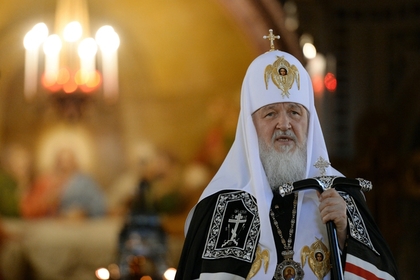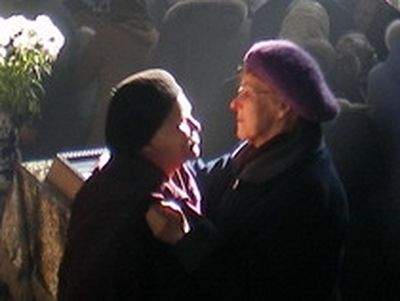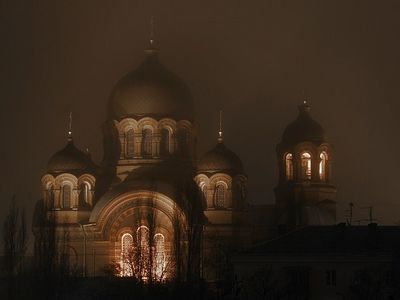In the name of the Father and of the Son and of the Holy Spirit.
With this evening’s service, we enter onto the field of Great Lent. We enter Great Lent through a special rite of forgiveness, and this is not coincidental. The first words preached by the Savior were a call to repentance: Repent: for the Kingdom of Heaven is at hand (cf. Mt. 4:17). If we consider these words, many questions arise. In what sense did the Savior speak about the Kingdom of Heaven, the Kingdom of God, drawing near? Two thousand years later we see that the Kingdom of God has not come into the world. But the Savior spoke many times about the approaching Kingdom of God: There be some of them that stand here, which shall not taste of death, till they have seen the kingdom of God come with power. (cf. Mk. 9:1). And these words are not in vain, but are a testimony to the great truth that with the coming of the Savior into the world the Kingdom of God became accessible to every man. Everyone who comes into the world has the possibility to enter into the Kingdom of God.
But there is an essential condition, there is an “entrance ticket” to this Kingdom, and this condition is repentance. The Kingdom of God, which, according to the Savior Himself, is within every person (cf. Lk. 17:21), is a kingdom of peace, joy, truth, love, and blessedness. The Kingdom of God is the fullness of being, both in this earthly life, and in the life of the age to come. Translated into the usual human language we use, the Kingdom of God is great, absolute happiness, and there can be no greater amount.
Surprisingly, to enter into this kingdom, nothing is required of those things that are so coveted, so necessary, and so important for every modern person. To enter into this kingdom, it’s not necessary to have a high place in society. To enter into this kingdom, it’s not necessary to be a powerful, authoritative person. To enter into this kingdom, you don’t need money or any human success. To enter into this kingdom, you must repent, and there are no other conditions. And therefore the Kingdom of God is open to all—to the rich and to the poor, to the powerful and to the weak, to the successful and even to those who are very unsuccessful from an everyday point of view.
And why specifically repentance? Because the Kingdom of God is a kingdom where God is present, where there is no evil, where there are no lies, where there is no moral filth, where there is light and truth. For wisdom will not enter the soul that plots evil, nor will it dwell in a body involved in sin (Wis. 1:4) the word of God teaches us. The light of the Divine Kingdom cannot enter into an evil soul, for light and darkness are incompatible. If there is darkness in light, then it is not light—we know this well from experience. Light is mingled with darkness at dusk, and dusk is not light. And where there is sin and evil, the fullness of God’s truths and kingdom cannot be.
Every one of us bears within himself human unrighteousness and sin. And moreover, throughout the course of life we so intermingle with our sins that they become part of our being; sometimes we even rely on these sins to accomplish our goals in life. Today is that day when we should think about our lives, and clearly realize that we cannot enter into the Kingdom of God with our sins and our unrighteousness. The Lord, descending to every one of us, gives us the amazing ability for self-cleansing. And this power, cleansing our human reason and human hearts, is repentance.
Repentance is first of all an awareness of our unrighteousness. We recognize the expediency of self-criticism in many spheres of human activity. We believe that political actors, incapable of critical evaluation of their own actions, act improperly. We believe that our boss, incapable of critically looking at his own work, is subject to mistakes. We believe that the executive who is unable to soberly assess his actions more often than not makes mistakes. Why, allowing critical evaluations of our professional abilities, skills, and actions, and considering it an essential and positive character of every person, do we so often exclude repentance from our lives? Repentance is critical evaluation of ourselves, but not before the face of others, because there is always something present that does not correspond to the full measure of truth in a self-critical attitude towards yourself, whether from weakness, from sickness, or from the unwillingness to reveal your soul to others. Repentance is the opportunity to throw off sin, having told yourself the truth about your own life, and doing this before the face of God.
This is why repentance is at the center of our Great Lenten endeavors. To help man repent before God, the Church introduces him to the special, grace-filled power of the Lenten services and prayers, and of the frequent communion of the Holy Mysteries of Christ. The time of Lent is the time of purifying the soul; it is the time when we prepare ourselves for receiving the Kingdom of God.
With what should our repentant endeavor begin? It must begin with a very simple, and at that same time very difficult task. In the first place, we must find within ourselves the strength and courage to offer our repentance before our neighbors, no matter how difficult and painful it is—before the face of those who we offended and even before the face of those who offended us, to offer repentance, and to say those simple words “forgive me,” and to say it not mechanically, not only as custom, but with full awareness that without this reconciliation with our neighbors there can be no inner purification, and we cannot begin the road to the Kingdom of God. And the Church calls us to this act today. May we find within ourselves the strength to say “forgive me” to our neighbors, firstly to those with whom we live side by side, often having household, family conflicts, and to those with whom we work and to anyone with whom our relationship may have been darkened, to those near and far, because repentance before our neighbors is the first step on the path of our repentance before God. May the Lord help us all to find the inner strength to take today such an important step on the path to the Kingdom of God. Amen.
I am aware that I have not been able to do everything that people expected of me. I am aware that my words may have annoyed someone, causing disagreement and generating the potential for conflict. I am aware also that I cannot do everything I wanted to do and which people expected from me, due to human weakness. I am also aware that due to human frailty I may have offended someone, voluntarily or involuntarily, in word or deed or even in thought. For all of this, before you, and before your faces—before the whole Church, before our people I offer repentance. Bless and forgive me fathers, brothers, and sisters. Now I will read a prayer before the beginning of Great Lent.




